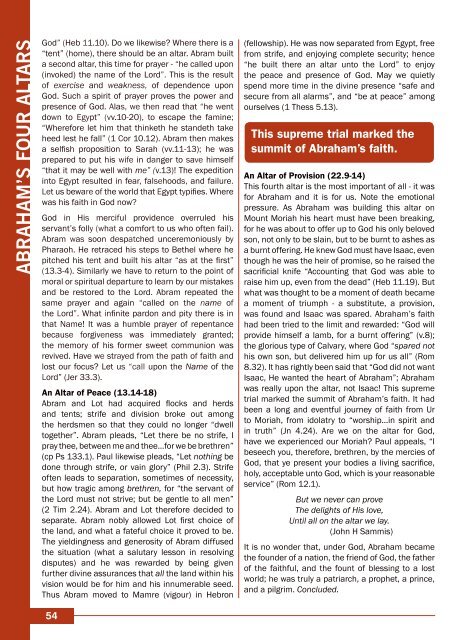You also want an ePaper? Increase the reach of your titles
YUMPU automatically turns print PDFs into web optimized ePapers that Google loves.
ABRAHAM’S FOUR ALTARS<br />
God” (Heb 11.10). Do we likewise? Where there is a<br />
“tent” (home), there should be an altar. Abram built<br />
a second altar, this time for prayer - “he called upon<br />
(invoked) the name of the Lord”. This is the result<br />
of exercise and weakness, of dependence upon<br />
God. Such a spirit of prayer proves the power and<br />
presence of God. Alas, we then read that “he went<br />
down to Egypt” (vv.10-20), to escape the famine;<br />
“Wherefore let him that thinketh he standeth take<br />
heed lest he fall” (1 Cor 10.12). Abram then makes<br />
a selfish proposition to Sarah (vv.11-13); he was<br />
prepared to put his wife in danger to save himself<br />
“that it may be well with me” (v.13)! The expedition<br />
into Egypt resulted in fear, falsehoods, and failure.<br />
Let us beware of the world that Egypt typifies. Where<br />
was his faith in God now?<br />
God in His merciful providence overruled his<br />
servant’s folly (what a comfort to us who often fail).<br />
Abram was soon despatched unceremoniously by<br />
Pharaoh. He retraced his steps to Bethel where he<br />
pitched his tent and built his altar “as at the first”<br />
(13.3-4). Similarly we have to return to the point of<br />
moral or spiritual departure to learn by our mistakes<br />
and be restored to the Lord. Abram repeated the<br />
same prayer and again “called on the name of<br />
the Lord”. What infinite pardon and pity there is in<br />
that Name! It was a humble prayer of repentance<br />
because forgiveness was immediately granted;<br />
the memory of his former sweet communion was<br />
revived. Have we strayed from the path of faith and<br />
lost our focus? Let us “call upon the Name of the<br />
Lord” (Jer 33.3).<br />
An Altar of Peace (13.14-18)<br />
Abram and Lot had acquired flocks and herds<br />
and tents; strife and division broke out among<br />
the herdsmen so that they could no longer “dwell<br />
together”. Abram pleads, “Let there be no strife, I<br />
pray thee, between me and thee…for we be brethren”<br />
(cp Ps 133.1). Paul likewise pleads, “Let nothing be<br />
done through strife, or vain glory” (Phil 2.3). Strife<br />
often leads to separation, sometimes of necessity,<br />
but how tragic among brethren, for “the servant of<br />
the Lord must not strive; but be gentle to all men”<br />
(2 Tim 2.24). Abram and Lot therefore decided to<br />
separate. Abram nobly allowed Lot first choice of<br />
the land, and what a fateful choice it proved to be.<br />
The yieldingness and generosity of Abram diffused<br />
the situation (what a salutary lesson in resolving<br />
disputes) and he was rewarded by being given<br />
further divine assurances that all the land within his<br />
vision would be for him and his innumerable seed.<br />
Thus Abram moved to Mamre (vigour) in Hebron<br />
54<br />
(fellowship). He was now separated from Egypt, free<br />
from strife, and enjoying complete security; hence<br />
“he built there an altar unto the Lord” to enjoy<br />
the peace and presence of God. May we quietly<br />
spend more time in the divine presence “safe and<br />
secure from all alarms”, and “be at peace” among<br />
ourselves (1 Thess 5.13).<br />
This supreme trial marked the<br />
summit of Abraham’s faith.<br />
An Altar of Provision (22.9-14)<br />
This fourth altar is the most important of all - it was<br />
for Abraham and it is for us. Note the emotional<br />
pressure. As Abraham was building this altar on<br />
Mount Moriah his heart must have been breaking,<br />
for he was about to offer up to God his only beloved<br />
son, not only to be slain, but to be burnt to ashes as<br />
a burnt offering. He knew God must have Isaac, even<br />
though he was the heir of promise, so he raised the<br />
sacrificial knife “Accounting that God was able to<br />
raise him up, even from the dead” (Heb 11.19). But<br />
what was thought to be a moment of death became<br />
a moment of triumph - a substitute, a provision,<br />
was found and Isaac was spared. Abraham’s faith<br />
had been tried to the limit and rewarded: “God will<br />
provide himself a lamb, for a burnt offering” (v.8);<br />
the glorious type of Calvary, where God “spared not<br />
his own son, but delivered him up for us all” (Rom<br />
8.32). It has rightly been said that “God did not want<br />
Isaac, He wanted the heart of Abraham”; Abraham<br />
was really upon the altar, not Isaac! This supreme<br />
trial marked the summit of Abraham’s faith. It had<br />
been a long and eventful journey of faith from Ur<br />
to Moriah, from idolatry to “worship…in spirit and<br />
in truth” (Jn 4.24). Are we on the altar for God,<br />
have we experienced our Moriah? Paul appeals, “I<br />
beseech you, therefore, brethren, by the mercies of<br />
God, that ye present your bodies a living sacrifice,<br />
holy, acceptable unto God, which is your reasonable<br />
service” (Rom 12.1).<br />
But we never can prove<br />
The delights of His love,<br />
Until all on the altar we lay.<br />
(John H Sammis)<br />
It is no wonder that, under God, Abraham became<br />
the founder of a nation, the friend of God, the father<br />
of the faithful, and the fount of blessing to a lost<br />
world; he was truly a patriarch, a prophet, a prince,<br />
and a pilgrim. Concluded.


